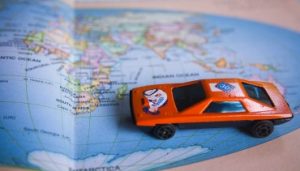Travel is expensive. It is a given. It is also the first stumbling block everyone should overcome when they decide to go somewhere new – near or far. Money can make or break any of your travel plans, so preparation is the key. Start saving money as early as possible and set aside a travel fund that is strictly for travel only.
 Make sure your travel plans include the budget for your plane flight, accommodation, food, and pocket money. But of course, it should be a given that you already prepared for the right set of clothing and shoes including pocket-sized toiletries well ahead of time.
Make sure your travel plans include the budget for your plane flight, accommodation, food, and pocket money. But of course, it should be a given that you already prepared for the right set of clothing and shoes including pocket-sized toiletries well ahead of time.
The idea of traveling abroad while still in college can be intimidating when thinking about how much money it will cost. Most people believe that it costs an arm and a leg to travel through Europe. They are wrong. If you’re smart about your travels and are willing to “rough it” a little, you can travel on a budget.
The price of your travels will determine your destination. I’m sure you’ve come across one of those articles on Facebook where it lists the top 10 cheapest destinations in the world. Forbes came up with a great list of potential places to travel.
(Via: http://www.uloop.com/news/view.php/230536/5-Things-First-Time-Travelers-on-a-Budget-Need-to-Know)
Do not be afraid to travel as far away as you can manage as long as you have prepared for it. Planning ahead of time can help you save money, time and effort, so you have nothing left to do but to enjoy the experience and create lots of wonderful memories of your trip.
Spend more time planning
You already know time is money (especially if you’ve hired a handyman, a lawyer, or a psychiatrist) and the same logic applies to traveling. Josh Summers and his wife started touring the world as newlyweds, fell in love with Asia and Europe, and never looked back. These days, they give tips to others on how to make travel more accessible on their blog, Travel China Cheaper. For the Summers duo, taking the hours to carefully detail their trips has been game-changing. “I believe that every hour spent planning a trip directly correlates to savings once you depart. For example, if you can arrange your domestic flights a couple months in advance, it’s possible to save hundreds of dollars over doing it once you arrive in the country,” he explains.
Another great way to help you travel on a budget is to pack only the bare necessities, so you don’t have to worry about paying for (expensive) excess baggage.
“Become an expert packer with just a carry-on bag.This sometimes involves tightly rolling your clothes and dressing in layers to avoid bringing a second suitcase. If you have to check a bag, always make sure to weigh it before you leave the house,” he explains. “Some airlines charge extra depending on how much your bag weighs, so always make sure to check the rules online. Lastly, stick with the airlines that allow you to check your first bag free. You can save up to $100 if you pack efficiently.
(Via: https://money.good.is/articles/money-saving-world-travel-tips)
And when possible, travel to a certain destination during off-peak seasons so ticket prices are low and the place is not that crowded.
You can keep travel expenses manageable if you time your trips right. For starters, avoid traveling during the peak season, if possible.
“It’s amazing what a difference it can make to go a few weeks after peak season,” said Greg Geronemus, co-CEO of smarTours, a guided tour company based in New York City. “You can get essentially the same weather and spend a lot less on everything from airfare to hotels.” For example, rather than limiting your search for flights and accommodations at the beach to one week in the summer, check prices across all the summer months and even in late spring and early fall to find the best deals.
If your schedule allows you to travel only during the peak season, make sure you don’t plan a trip for the “peak” of peak season. “Book away from major holiday periods,” said Jay Walker, chairman and CEO of Upside.com, a business travel booking site. “Memorial Day, July Fourth and Labor Day are generally when summer travelers will pay the most for their itineraries.”
Avoiding peak travel times can also save you money. For example, Walker recommends flying early in the morning or late at night and on Tuesdays or Sundays to get the cheapest fares.
“Even small, incremental changes in itinerary can generate discounts on travel, even during peak summer travel seasons,” he said. “If you have to travel during a given week, try adding or subtracting a day from your itinerary. Often, a change of a day or two will generate a cheaper fare or rate.”
(Via: http://www.reviewjournal.com/life/travel/7-travel-expenses-you-can-easily-avoid)
Traveling has its pros and cons but as long as you know what you want and make preparations months ahead, it is possible to realize that dream vacation of yours. Sticking to a budget may be a bummer for some but that’s real life. Most of us aren’t made of money and just being able to travel (especially abroad) is a blessing in itself.
Take these tips to (mind and) heart and you’ll no longer be stressed all the time you are on the road. Not all the time everything you planned will happen as it is, so give yourself a break and make the most of your vacation. Looking back you’ll realize that those little surprises are what stands out the most in your memories and you won’t have it any other way.
